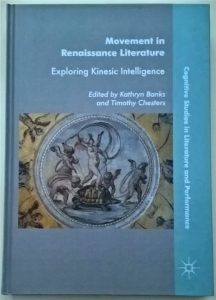Movement in Renaissance Literature: Exploring Kinesic Intelligence, ed. Kathryn Banks and Timothy Chesters (Palgrave, 2017)
So this book has suddenly arrived, and I have an essay in it. I keep drafting sentences which grow to resemble Pindaric Odes, not in a good way, as I praise and thank the editors and the contributors. The thing is, this is one outcome of a particularly happy phase in my research career (not over yet!), thinking about fascinating things with fascinating people. I don’t think my enthusiasm for the line-up is just a matter of friendship, though — with essays (in order of appearance in the book) by Terence Cave, Ulrich Langer, Timothy Chesters, Kathryn Banks, Guillemette Bolens, Dominique Brancher, Laura Seymour, Mary Thomas Crane, Evelyn Tribble, and Ellen Spolsky (and me too), this is a really good way into a cool field.

I have written about kinesic intelligence on the blog here, and a little bit here. The phrase denotes the way that we draw inferences from our sensorimotor responses. It has been shown that our brains mirror, or simulate (no metaphor is perfect) the movements of others, and it has been plausibly argued that this is a basis on which we engage with others, interpret their intentions, understand their motivations, and so on. In literature, for example in descriptions of apparently minor gestures in novels, this ability is awakened, tested, and thought over.
My essay is about ‘Vital Signs in Shakespeare’. I focused on the signs of life that an audience might look for when characters in his plays — as they frequently do — are on the border between death and animation. We might look out for breath, warmth, the feeling of weight, stirring. I argue that in the theatre we look at these things as the incidental by-products of a character’s being alive, but also as the intentional actions of a skilled actor handling a difficult challenge in their work. In the Shakespearean theatre our kinesic intelligence is engaged by the most basic signs of life via a curious route: we learn something about what it is like to be alive by thinking about what it takes to pretend to be alive. It was fun to write, and now it’s part of a book I heartily recommend.